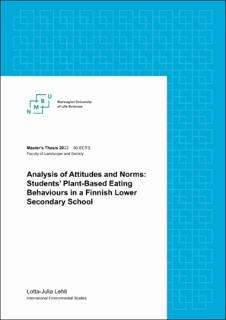Analysis of attitudes and norms : students’ plant-based eating behaviours in a Finnish lower secondary school
Master thesis
Permanent lenke
https://hdl.handle.net/11250/3005421Utgivelsesdato
2022Metadata
Vis full innførselSamlinger
- Master’s theses (LandSam) [1166]
Sammendrag
Despite meat eating’s negative environmental and health outcomes, meat-heavy diets dominate the current food culture in Finland. However, in the past decade, plant-based eating has become a trending topic due to the increasing environmental and health concerns. Consequently, plant-based diets have been promoted by several means in which Finnish schools have an important role in educating and accustoming students to plant-based eating by offering plant-based school lunch options for all students. Despite this progress, students’ willingness to eat plant-based school lunch options has remained low. Thus, this thesis aims to study how attitudes and subjective norms toward plant-based eating could improve students’ willingness to eat plant-based foods. To study this, the thesis applies the Theory of Reasoned Action, which emphasises the role of attitudes and subjective norms in one’s behaviour. The study follows a qualitative research method based on semi-structured focus group interviews which involve twelve students from Tiirismaa lower-secondary school in Lahti, Finland. Besides, document analysis and personal communications with relevant sources are used. The thesis analyses the results according to the theory and characteristics of the data in a thematic analysis. Firstly, the students’ attitudes toward plant-based eating are analysed in relation to four different outcomes: environmental outcomes, animal welfare, health-related outcomes, and taste of plant-based foods. The results show that animal welfare motivated the students the most to eat plant-based foods, whereas environmental outcomes to a lesser extent increased the students’ willingness to eat plant-based foods. In contrast, health-related outcomes and taste divided the students’ opinions radically between the students who were familiar with plant-based diets and those who were less familiar with plant-based diets. Secondly, the students’ subjective norms toward plant-based eating are analysed according to how norms among the students’ friends and family members, as well as social media, have influenced them. Family members were found to affect the students’ eating behaviours the most, while friends and social media had no significant effect on the students’ dietary habits. Thirdly, linkages between the students’ attitudes and subjective norms are analysed. Norms among the students’ family members were found to have a strong influence on the students’ attitudes toward environmental and health outcomes as well as opinions on the taste of plant-based foods. Thus, this thesis concludes that the students’ eating behaviours are mostly influenced by norms among their family members which, in turn, shape the students’ attitudes toward plant-based eating. At last, the thesis recommends that schools should take more responsibility in educating students on the benefits of plant-based eating as this could provide a more even starting point for all students to decide on the adaptation of plant-based eating habits.

